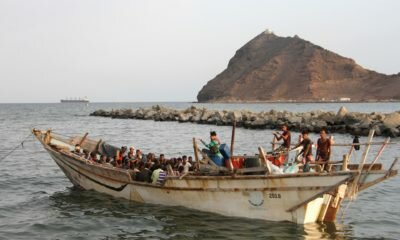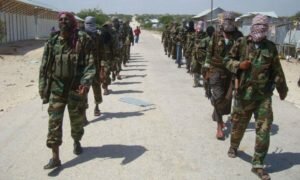Somali refugees enslaved in Libya return home
Published
5 days agoon
Eleven Somali refugees held captive in Libya for years have returned home. Many African refugees have been tortured and some were sold as slaves in the country, which was used as a transit hub for those trying to reach Europe.
Al Jazeera’s Katia Lopez-Hodoyan reports.
You may like
-


Somali Migrants Returning From Libya Tell of Abuse, Horror
-


Somali migrants in Libya don’t want to go home
-


Truck packed with migrants crashes in Libya, killing at least 19
-


African Migrants Crossing From Mexico Face Lengthy Detention, Deportation
-


People traffickers fire at refugees, forcing them into sea off Yemen coast
-


At Least 30 Somalis, Ethiopians Drown Off Yemen Coast
Somali News
BREAKING: 2 blasts, gunfire rock Somalia’s capital
Published
2 hours agoon
Feb 23, 2018
MOGADISHU, Somalia (AP) — A Somali police official says two car bomb blasts have rocked the capital, Mogadishu, followed by sustained gunfire. Three people have been killed.
Capt. Mohamed Hussein says the first blast, apparently caused by a suicide car bomber, occurred near Somalia’s intelligence headquarters.
The second blast occurred near parliament’s headquarters, where security forces have engaged with gunmen thought to be trying to attack the presidential palace.
The explosions have shattered a months-long period of calm in Mogadishu, which is often the target of attacks by the al-Shabab extremist group.
There is no immediate claim of responsibility for Friday evening’s blasts.

AFP — Garowe – The new freezers at Somalia’s only forensic laboratory can store thousands of DNA samples, although for now there are just five.
The big hope is that they could be the start of a revolution in how the troubled Horn of Africa country tackles its widespread sexual violence – provided some daunting hurdles are overcome.
The first sample arrived at the start of the year taken on a cotton swab from the underwear of a woman, a rape victim from the village of Galdogob.
It was wrapped in paper and driven 250km to the Puntland Forensic Centre in Garowe, capital of semi-autonomous Puntland, slipped into a protective glass tube and placed in one of the three ultra-low temperature fridges.
If DNA ID can be teased from the sample, this would be a crucial step in convicting the woman’s rapist.
No longer would it be a case of he-said-she-said, in which the survivor is less often believed than the accused. Two decades of conflict and turmoil have made Somalia a place where lawlessness and sexual violence are rampant.
“Now, people who have been raped hide because they don’t have evidence,” said Abdifatah Abdikadir Ahmed, who heads the Garowe police investigations department.
But with the lab, he said, “it’s a scientific investigation. There are biological acts you can zero in on.”
Challenges
Not yet, however.
Abdirashid Mohamed Shire, who runs the lab, has a team of four technicians ready but is awaiting the arrival of the final pieces of equipment.
Their work to provide the evidence that might convict or exonerate is yet to begin.
And the pressure is on. The freezers mean the DNA samples can be safely stored for years but Somali law allows a rape suspect to be held for a maximum of 60 days. Shire needs the analysis and identification machines urgently so that, as he put it, “justice will be timely served”.
The laboratory, partly funded by Sweden, was launched last year after the Puntland state government enacted a Sexual Offences Act in 2016, which criminalised sexual offences and imposed tough penalties.
But technology alone will not solve Somalia’s many judicial weaknesses.
The DNA sample from Galdogob, for example, was stored in unclear and unrefrigerated conditions for five days before being sent to the lab, meaning a defence counsel could potentially argue the DNA evidence had been tampered with.
Human rights lawyers worry the new lab might backfire for this reason.
“A lot of thought needs to be given to how the chain of custody can be preserved in these kinds of cases,” said Antonia Mulvey of Legal Action Worldwide, a Kenya-based non-profit organisation.
More fundamental still is the failure of Somalia’s police to take sexual assault cases – and their jobs – seriously.
Corruption is rife, with a legal advisor to Puntland’s justice ministry saying officers “meddle” in cases, undermining them for personal gain.
“My concern is that the corrupted system could not make a sure success of the lab,” the advisor said, requesting anonymity to speak candidly. “Investing in the lab is good, but we need to think about the preconditions.”
The UN Population Fund (UNFPA) which helped pay for the lab is trying to address this by running training programmes for dozens of the Garowe police on sample collection, gender violence investigations and documentation.
But, the legal advisor cautioned that donors can only do so much.
“The issue is more complicated than training police. It relates to the political commitment of the government. UNFPA can train police but who will pay those you train? Are they given power to do the work?”
Briefing Room
US military says drone strike in Somalia kills 4 extremists
Published
1 day agoon
Feb 22, 2018
VOA — A U.S. drone strike has killed several al-Shabab militants in southern Somalia, officials tell VOA.
Local sources said missiles fired Wednesday targeted a rickshaw carrying five al-Shabab militants near Jamaame, in the southern Lower Juba region.
“I can tell you that the airstrike hit a rickshaw and that five militants were killed. It was carried out by U.S. drone, helping our intelligence forces on the ground,” a Somali government official told VOA Somali on the condition of anonymity.
The attack was confirmed by witnesses and local residents, who also asked for anonymity because they feared militant reprisals.
Somali officials said they were investigating the identity of those targeted. Some sources said two of those in the rickshaw were civilians traveling with three militants.
A statement Thursday from the U.S. Africa Command said the strike was carried out by the U.S. military “in coordination with the Federal Government of Somalia.” The statement said the strike killed four terrorists and no civilians.
On Tuesday, local residents in the region reported another airstrike that destroyed an al-Shabab training camp in the nearby town of Jilib. That airstrike, also confirmed by U.S. Africa Command, killed three militants.
The U.S. military has carried out dozens of airstrikes against al-Shabab and Islamic State militants in support of Somalia’s federal government.

BREAKING: 2 blasts, gunfire rock Somalia’s capital

Somalia’s first forensic lab targets rape impunity

Two Somali men stabbed to death in north London as 2018 toll reaches 15

Ismail Mohamed Wants To Be Ohio’s First Somali-American Legislator

Novels my way to respond in measured way: Nadifa Mohamed

Djibouti ends Dubai’s DP World contract to run container terminal

Canadians call for return of relative held in Ethiopia

Father cleared after judge says evidence of FGM on six-year-old was ‘wholly inconclusive’

INTERVIEW: Somalia gears towards improving its monetary policies

US military says drone strike in Somalia kills 4 extremists

Somalia’s first forensic lab targets rape impunity

Canadians call for return of relative held in Ethiopia

Two Somali men stabbed to death in north London as 2018 toll reaches 15

INTERVIEW: Somalia gears towards improving its monetary policies

Novels my way to respond in measured way: Nadifa Mohamed

Somalia: Detained Children Face Abuse + INTERVIEW

Families plead for update on Somali deportation case at impromptu town hall

U.S. military denies Al-Shabaab killed its soldier in Somalia

US military says drone strike in Somalia kills 4 extremists

BREAKING: 2 blasts, gunfire rock Somalia’s capital

INTERVIEW: Somalia gears towards improving its monetary policies

Somalia: Detained Children Face Abuse + INTERVIEW

Families plead for update on Somali deportation case at impromptu town hall

Somalia Tax Argument From Both Sides: Bakara Traders vs The Government

Somalia military court sentences army officer to death

Somali traders boycott business over new government tax

Somali refugees enslaved in Libya return home

Somali Migrants Returning From Libya Tell of Abuse, Horror

Somali government introduces 5% sales tax to boost revenues

LONDON: Crowd pickets Wormwood Scrubs demanding justice following death of inmate
TRENDING
-

 Crime20 hours ago
Crime20 hours agoSomalia’s first forensic lab targets rape impunity
-

 Canada22 hours ago
Canada22 hours agoCanadians call for return of relative held in Ethiopia
-

 Crime20 hours ago
Crime20 hours agoTwo Somali men stabbed to death in north London as 2018 toll reaches 15
-

 Business1 day ago
Business1 day agoINTERVIEW: Somalia gears towards improving its monetary policies
-

 Books20 hours ago
Books20 hours agoNovels my way to respond in measured way: Nadifa Mohamed
-

 Reports2 days ago
Reports2 days agoSomalia: Detained Children Face Abuse + INTERVIEW
-

 Minnesota2 days ago
Minnesota2 days agoFamilies plead for update on Somali deportation case at impromptu town hall
-

 Briefing Room2 days ago
Briefing Room2 days agoU.S. military denies Al-Shabaab killed its soldier in Somalia



You must be logged in to post a comment Login